
Story of the Mongolian Tiger - Part 3
Once while in the mountains of China, he was attacked by several bandits. One of the bandits grabbed Takamatsu around the waist. The bandit suddenly screamed and, letting go of Takamatsu , fell to the ground holding his face. Takamatsu later said he did not know what he had done to the man, but feeling something wet and warm in his hand, realized he had plucked the man's eye out. He gave the bandit first aid and then charged him for his services.
Mortal combats were a consequence of teasing by other martial artists, who heard for his fame. Takamatsu lost an eye in one of those combats. It was replaced by one made of glass.
After he spent ten years in China , Takamatsu returned to Japan and there he went in Tendai monastery on Hiei mountain near Kyoto and became a monk. He later became one of the representatives of the monastery. That way he compensated for the sins of his youth.
He was married to Tane Takamatsu , who was born in 1896 in Hirakata region. Her maiden last name was Uno . They did not have any direct descendants, so they adopted two girls. Takamatsu also taught a lot of students in Japan , although he was formally known as master of Ju Jutsu and Bo jutsu . Of all schools he successed, he was only known for Kukishinden ryu . His first Dojo was called Sukisha Dojo (place for people, who enjoy training martial arts).
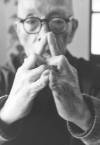
It is said that when training with Takamatsu there was never any warm up. Even when using real weapons the same was true. Takamatsu said that in a real fight there would be no time to warm up before hand.
In the late 1960's Takamatsu wrote some articles for some Japanese newspapers. These articles spoke of Ninjutsu and the other arts in which he trained. In one article he wrote that in true martial arts, when fighting, you must be prepared to kill your attacker. After reading this, a very high ranking Karate master went on Japanese television and said that what Takamatsu had written was wrong and out-dated, no longer necessary in this day and age. He called Takamatsu an "old has-been". Takamatsu arranged a television interview and said that he saw the Karate master's comments as a challenge, which he wished to accept. He gave the Karate master three days to publicly retract his statement. If he refused, Takamatsu intended to fight him and kill him with his hands tied behind his back. Within the three days the Karate master retracted his statement.
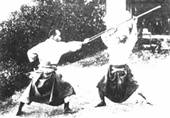
Later, when training with Takamatsu , Hatsumi saw him stumble and fall onto one knee. Hatsumi Sensei said that it was then that he realized that perhaps Takamatsu 's life was drawing to an end. Hatsumi took several students to meet and train with Takamatsu .
Two things Takamatsu really enjoyed were walking and painting. He liked to walk every day for approximately one hour (he said that he was a very bad time keeper), covering approximately 8 miles. He would usually take his dogs (he had Spitzes) with him on his walks. Just for his own pleasure he would paint everyday, simply because he enjoyed it and found it relaxing.
Takamatsu died on April 2, 1972 at the age of 85. He is buried in the Kumedra cemetery near Nara .
Only a few people knew that he was in fact the last representative of the rich tradition of ninjutsu . It is said that his neighbours were amazed when they found out that he was also a ninja warrior.
Takamatsu Sensei was a great man and an example of a true martial artist. He was the last of the real Ninja warriors, who were involved in a real combat. It is said that when they read his obituary, his neighbours were shocked to discover the full details of his life as a master of a martial arts.
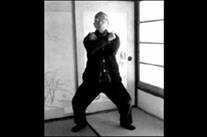
Out take from an interview with Takamatsu in 1963
The Last Ninja
Toshitsugu Takamatsu Sensei says, "When I was 14 or 15 years old, sometime during the thirties of the Meiji era (first decade of the 1900s), I used to play the ball game cricket with members of the British Navy in a Kobe city park. I was a very fast runner, and in those days I had the nickname "Kisha" (meaning a fast locomotive). Once I got on base, I never failed to steal another base. I was very good at sliding. Once I was on base, our team knew that we would score a point."
Toshitsugu Takamatsu began training in the martial arts in his childhood, and he seemed to have the natural capacity to become a ninja. "I am 74 years old, but whenever I meet someone, I tell them I am 18. That way I start to believe I am 18. Even now, whenever I have a match with a judo player, I am sure to throw him once I get my hands on the collar of his gi. As for a boxer, you take a fighting pose with one arm extended out, to make it difficult for him to find an opening for his punches. A ninja uses a ninja's strategy for fighting."
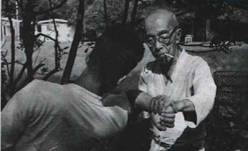
The reporter asked Takamatsu Sensei, "What would you do against a professional wrestler?"
He replied without a pause, "Even in Kashiwabara City (the small town in the mountains south of Kyoto and west of Iga where Takamatsu-sensei lived) there were wrestling matches with such famous wrestlers as Rikidozan (Western style pro wrestler famous in post WWII Japan) and others. Certainly professional wrestlers are in great shape, so if they really fought in a serious way, it would be difficult for a match to last very long. The reason they can fight for so long is that they are careful to avoid damage to vital spots. That is why they can have match after match from one day to the next. If they bite, they use their lower teeth to the forehead in order to draw lots of blood in a very visible way. When they stomp to the stomach, they coordinate it with an out breath. In professional wrestling, there are rules, and these rules are observed very carefully."
This is Takamatsu Sensei's interpretation. I asked if a modern ninja like him could win in a fight with Rikidozan or other famous wrestlers?
"If I had to fight Rikidozan, there is only one way for me to win. Of course, if he can hit me first with his karate, I would lose. So then what is my winning method? I would use both palms to his ears with a sharp strike. This is the ninja's happa-ken ("eight-leaves fist" sharp palm smack) strike. When I use this strike, it breaks both eardrums. Even a powerful man like Rikidozan would wind up with a concussion. If this happa-ken is used as a part of modern fighting arts, it will produce power as great as or even more fearsome than Rikidozan's karate."
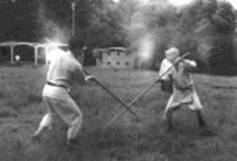
Essay By Takamatsu
The essence of all martial arts and military strategies is self-protection and the prevention of danger. Ninjutsu epitomizes the fullest concept of self-protection of not only the physical body, but the mind and spirit as well. The way of the ninja is the way of enduring, surviving, and prevailing over all that would destroy one. More than merely delivering strikes and slashes, and deeper in significance than the simple out-witting of an enemy; ninjutsu is the way of attaining that which we need while making the world a better place. The skill of the ninja is the art of winning.

In the beginning study of any combative martial art, proper motivation is crucial. Without the proper frame of mind, continuous exposure to fighting techniques can lead to ruin instead of self-development. But this fact is not different from any other beneficial practice in life carried to extremes. Medical science is dedicated to the betterment of health and the relief of suffering, and yet the misuse of drugs and the exultation of the physician's skills can lead people to a state where an individual's health is no longer within his or her personal control. A nutritious well-balanced diet works to keep a person alive, vital, and healthy, but grossly over-eating, over-drinking, or taking in too many chemicals is a sure way to poison the body. Governments are established to oversee the harmonious inter-working of all parts of society, but when the rulers become greedy, hungry for power, or lacking in wisdom, the country is subjected to needless wars, disorder, or civil and economic chaos. A religion, when based on faith developed through experience, a broad and questing mind, and an unflagging pursuit of universal understanding, is of inspiration and comfort to people. Once a religion loses its original focus, however, it becomes a deadly thing with which to deceive, control, and tax the people through the manipulation of their beliefs and fears. It is the same with the martial arts. The skills of self-protection, which should provide a feeling of inner peace and security for the martial artist, so often develop without a balance in the personality and lead the lesser martial artist into warped realms of unceasing conflict and competition which eventually consume him.
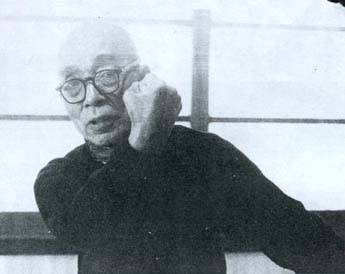
If an expert in the fighting arts sincerely pursues the essence of ninjutsu, devoid of the influence of the ego's desires, the student will progressively come to realize the ultimate secret for becoming invincible - the attainment of the 'mind and eyes of the divine.' The combatant who would win must be in harmony with the scheme of totality, and must be guided by an intuitive knowledge of the playing out of fate. In tune with the providence of heaven and the impartial justice of nature, and following a clear and pure heart full of trust in the inevitable, the ninja captures the insight that will guide him successfully into battle when he must conquer and conceal himself protectively from hostility. The vast universe, beautiful in its coldly impersonal totality, contains all that we call good and bad, all the answers for all the paradoxes we see around us. By opening his eyes and his mind, the ninja can responsively follow the subtle seasons and reasons of heaven, changing just as change is necessary, adapting always, so that in the end there is no such thing as surprise for the ninja.
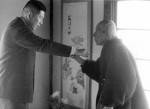
By Andrew Thomas (information gathered from everywhere)